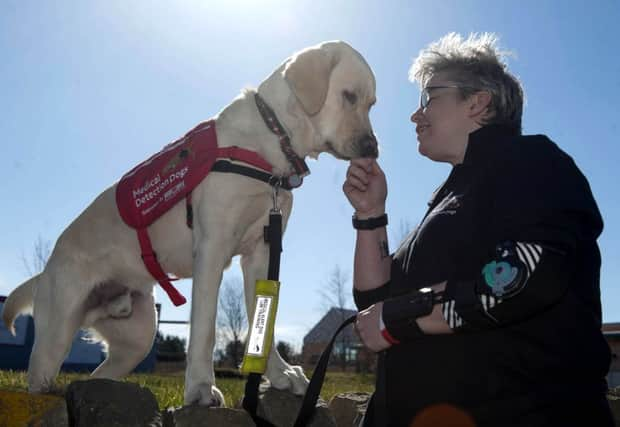Magic: The dog that can detect diabetic comas


Magic, a specially trained medical detection dog, has been stunning visitors to Moray College with his ability to sniff out when his owner, Claire Moon, is at risk of slipping into a diabetic coma.
It is now hoped that more patients with a serious form of diabetes which means they are not aware that they could be about to suffer a hypoglycaemic attack, where their blood sugar drops to dangerously low levels, could be helped by our canine chums.
Advertisement
Hide AdAdvertisement
Hide AdMagic is among around 50 dogs from across the UK who have been trained to use their sense of smell to detect minute changes in blood sugar levels by smelling their owner’s breath.
They can then warn them if they need to get help or take medication to stop them slipping into a coma.
The dogs are rewarded with a treat so they know they have performed well and will react the same way again.
Only one diabetes dog trained by the charity Medical Detection Dogs (MDD) is currently working in Scotland though many more people have expressed an interest in being paired with one.
The cause has been championed by Forres-based company AccuNostics, which itself is involved in developing technology to improve the accuracy and performance of blood sugar monitoring devices for diabetics.
After the company invited Magic and Mrs Moon to appear at a previous meeting at Moray College to raise awareness about diabetes risks, chief executive Giles Hamilton said he had been inundated with requests from people wanting to know more about medical detection dogs.
They have now visited again to demonstrate to students, business leaders and health staff how Magic provides a potentially life-saving service to his owner.
Mrs Moon, who lives near Cambridge, said since being paired with Magic by MDD over a year ago, he had alerted her to over 1,300 drops in her blood sugar which she was then able to react to.
Advertisement
Hide AdAdvertisement
Hide AdShe said before she got Magic she was having to check her blood sugar almost every hour to stop her suffering a hypoglycaemic attack, including throughout the night leaving her exhausted.
“I was looking at either having to give up my job or let my health go to ruin,” the 41-year-old said.
“Someone suggested I should apply for one of these dogs and since getting Magic life has never been the same since.”
Yvonne Nicholson, from Paisley, has had her diabetes dog Millie for almost two years and also said she had changed her life.
The 53-year-old said: “I used to have to do blood tests every half hour. But now Millie alerts me to any change up or down in my blood sugar levels.
“Before I wouldn’t have noticed. The biggest difference has been during the night.”
Mr Hamilton said the company was keen to support the work of MDD while also working to develop more conventional technology to help diabetic patients.
“There’s many hundreds of millions of pounds being spent trying to develop means of detecting changes in the level of glucose in your blood,” he said.
Advertisement
Hide AdAdvertisement
Hide Ad“But guess what, we’ve got four-legged friends on the ground who can already doing it with the appropriate training and support.
“We’re not saying it is a panacea for every single person with diabetes. But we think it is something that can make a significant difference to people, particularly those who are unaware when they are getting low blood sugar.”
AccuNostics is currently fund-raising to pay for a diabetes detection dog for someone in Moray.
It costs over £11,000 to pair a dog with a diabetes patient, including training as well as blood testing of the patient ahead of the pairing and support afterwards.
Dr Claire Guest, founder of MDD, said they would like to see more dogs working with diabetics across the UK.
“We already have a long waiting list of three years which we are committed to reduce as quickly as we can while still maintaining the same levels of training and support for clients,” she said.
“We are aware that these dogs can be life-transforming and life-changing.
“If you’re told you could be waiting three years for a dog and you are experiencing major difficulties or your child is, it is a very frightening time.”
About eight applications from patients in Scotland have been submitted to the charity.